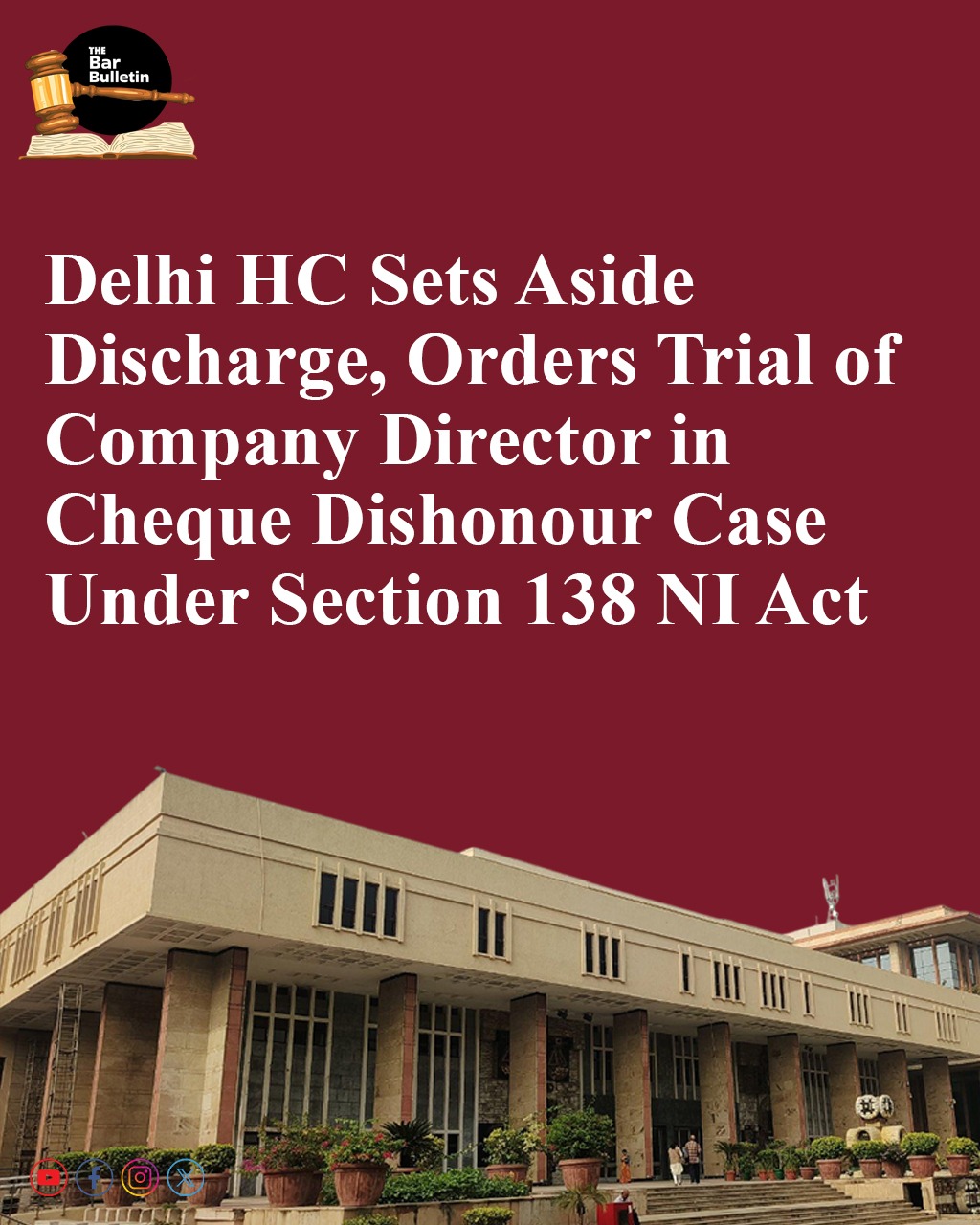The Delhi High Court allowed six connected petitions filed by the Rajasthan Tourism Development (RTDC) and set aside the impugned Order whereby the Respondent (accused no.3) had been discharged by setting aside the Order of Ld. MM dismissing the Application under Section 251 CrPC, for offence under Section 138/141 Negotiable Instruments Act, 1881. The Court held that the impugned Order of learned ASJ suffers from patent illegality and the Respondent being the Director of the Company is liable to be sued in the Complaint under Section 138 NI Act.
The petitioner contended that the role of the accused cannot be denied because he was one of the main Directors without whom the management and control of the Accused Company is not possible, and asserted that the Respondent had placed no documentary evidence to support his contention that he had no role in the Company. It argued that it was a trite law that once the Accused persons were summoned, the Complaint must proceed against the Directors/Accused persons unless he furnishes some sterling unconvertible material or acceptable circumstances to substantiate his contentions. It further submitted that the Ld. ASJ failed to appreciate the material placed on record in the Complaint for invoking Section 141 N.I. Act and erred in discharging as the Respondent who did not produce any material to substantiate his contention, especially after issuance of Summons. Reliance was placed on Adalat Prashad vs Rooplal Jindal, 2004 AIR (SCW)5174 and Deventra Kishanlla Dagalia vs Dwarkesh Diamonds Pvt. Ltd. 2013 AIR SCW 6735.
The case involved dishonoured cheques issued by M/s Luxury Trains Pvt. Ltd. which were presented by the Complainant but were dishonoured and returned with remarks “Exceeds Arrangement”. The Respondent/Accused moved an Application under Section 251 Cr.P.C. seeking discharge by alleging that there was no specific averment that the Respondent was “in charge and responsible” for the management and control of the affairs of the Company. The Ld. M.M dismissed the Application for discharge but the Respondent preferred 7 Revision Petitions out of which 6 were allowed and he was discharged while one Revision Petition was dismissed.
The Court observed that under the CrPC., there was no provision for seeking discharge by the accused once he had been summoned in a summons case, and the only option for him was to challenge the Summoning Order. The discharge under Section 251 CrPC. can be sought only in warrant trial cases. It further noted that, according to Section 174 of the Companies Act, a minimum of two Directors are necessarily required for a Company to function, and where there are only two Directors, they will necessarily be required to satisfy the quorum for Board Meetings. The court added that the Complainant, aside from asserting that being one of the two Directors of the Company the Respondent was involved in its affairs, cannot necessarily assert more about their actual involvement, and it is for the Respondent to demonstrate how, despite being one of the two Directors, he was not involved in the day-to-day affairs of the Company. The court referred to the Apex Court decision in Aneeta Hada vs. M/s Godfather Travels & Tours Pvt. Ltd., reported in AIR 2012 SC 2795, which observed that when a Company commits an offence, certain categories of persons in charge as well as the Company would be deemed to be liable for the offences under Section 138, and the statutory intendment is absolutely plain.
Justice Neena Bansal Krishna held that the learned ASJ had fallen in error in concluding that the averments in the complaint, that the respondent was the Director, were not sufficient to define his role in the day-to-day affairs of the company. Referring to a recent case of HDFC Bank Ltd. vs. State of Maharashtra, 2025 INSC 759, the Court held that criminal proceedings under Section 138 N.I Act against a Company Director cannot be dismissed solely because the Complaint does not precisely replicate the wording of Section 141.The court found the impugned order to be patently illegal and accordingly set it aside, holding that the respondent, as a Director of the company, can be prosecuted in the complaint under Section 138 of the NI Act. Consequently, the petitions were allowed and the impugned order was quashed.
Appearances:
Petitioner: Mr. Shafiq Khan, Advocate
Respondent No. 1: Mr. Shoaib Haider, APP
Respondent No. 2: Mr. Vikram Pandey, Adv.
![]()



